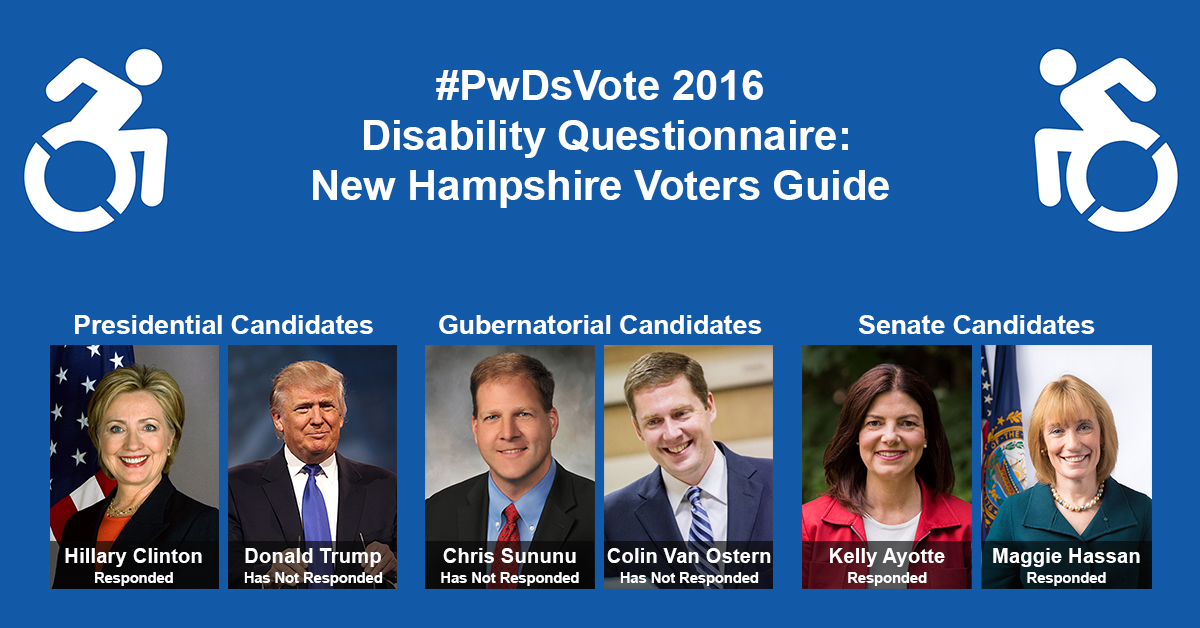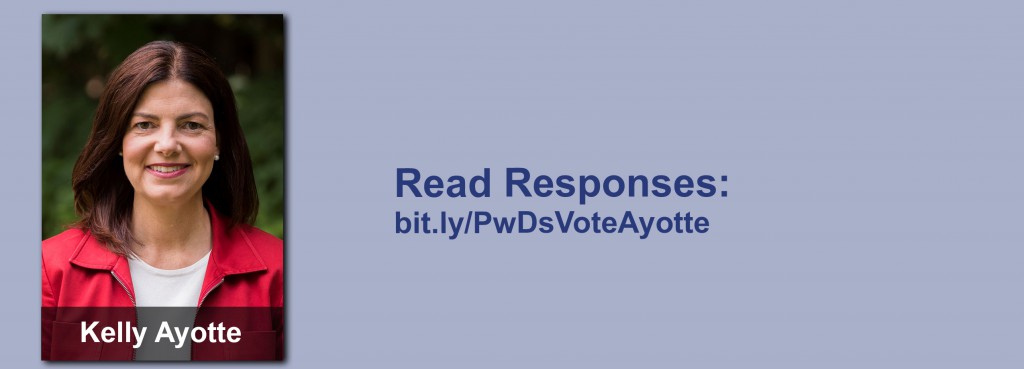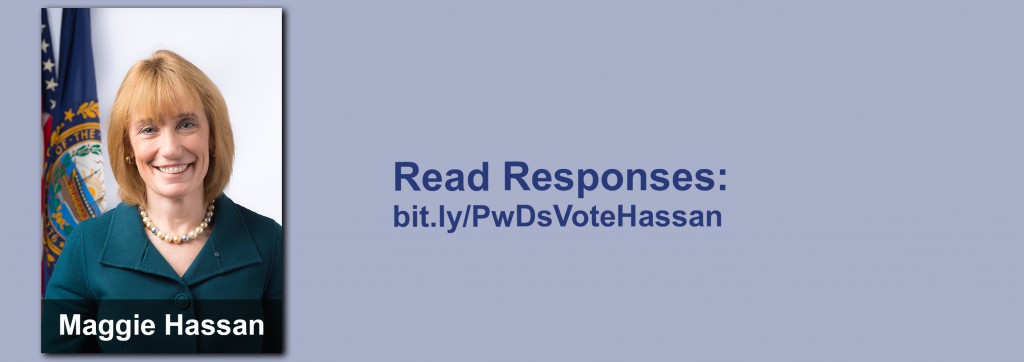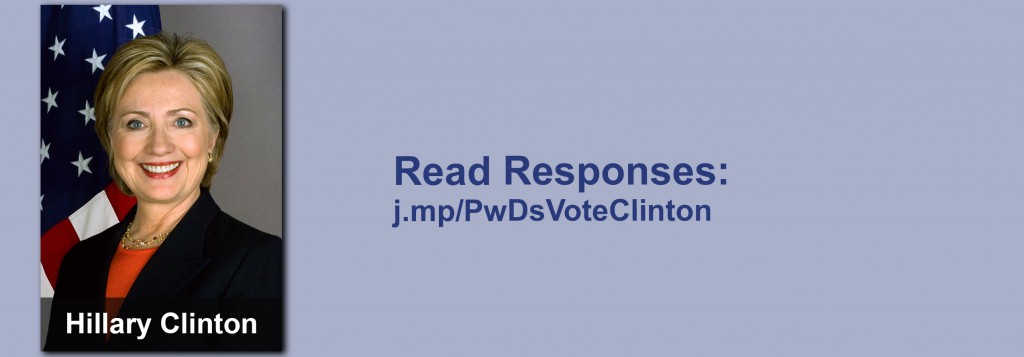Gubernatorial Candidates Have Yet to Complete #PwDsVote Disability Questionnaire
Washington, Oct. 11 – Citizens of New Hampshire will soon be heading out to vote for not only the upcoming presidential election, but also the statewide senate and gubernatorial elections. In turn, RespectAbility is releasing its New Hampshire Disability Voter Guide. Democrat hopeful Maggie Hassan and incumbent Republican Kelly Ayotte are running for New Hampshire’s Senate seat and have completed the #PwDsVote Disability Campaign Questionnaire for people with disabilities and have very different solutions to pressing problems. Presidential candidate Hillary Clinton also has completed the questionnaire. However, both candidates running for governor, Chris Sununu and Colin Van Ostern, have yet to respond to the questionnaire.
The #PwDsVote 2016 Campaign Questionnaires were designed by and for people with disabilities (PwDs) and those who love them to know where candidates stand on key disability issues. RespectAbility is nonpartisan and does not endorse candidates. The questionnaires are purely for educational purposes as voters go to the polls.
According to a new report from Rutgers University, 35.4 million people with disabilities will be eligible to vote in the November 2016 elections, representing close to one-sixth of the total electorate. That’s an increase of nearly 11 percent since 2008.
The presidential questionnaire was created during the primary season and asked all of the presidential candidates to comment on 16 disability questions. Former Secretary of State Hillary Clinton responded by addressing all of the questions. Despite numerous requests in person and by phone and email, the Trump campaign has not yet filled out the questionnaire. The American Association of People with Disabilities and the National Council on Independent Living also has a nonpartisan presidential questionnaire, which both Clinton and Trump have completed. Libertarian Gary Johnson and Green Party candidate Jill Stein have not filled out either questionnaire.
The down-ballot survey was adapted from the presidential questionnaire to ask gubernatorial candidates 16 questions and senatorial candidates 17 questions. All answers are posted verbatim and in full on The RespectAbility Report, a publication that covers the intersection of disability and politics.
Both major-party Senate candidates have responded to the survey, allowing the 166,258 citizens with a disability a chance to read their responses and compare them on a variety of issues. Gubernatorial candidates Chris Sununu and Colin Van Ostern have yet to respond.
New Hampshire already has much to be proud of in terms of competitive, integrated employment for people with disabilities. Forty percent of New Hampshire’s 77,800 working-age people with disabilities are employed. These numbers indicate that there is cause for optimism for the Granite State’s 5,900 youth with disabilities between the ages of 16 and 20. However, there is still much work to be done to improve outcomes for people with disabilities. Voters are looking to know where the candidates stand on important disability issues so that they can help improve these efforts.
Senate hopeful and current New Hampshire Gov. Maggie Hassan mentions her history in public service and her commitment to reducing stigmas against people with disabilities.
“I have worked throughout my career in public service to help reduce these stigmas, which are damaging to people who experience disabilities and the communities in which they reside,” she said. “That was one of the reasons I signed legislation making New Hampshire the first state in the country to prohibit employers from paying workers with disabilities less than the minimum wage – eliminating that double-standard for pay to help reduce the stigma associated with workers with disabilities.”
In her response, incumbent Sen. Kelly Ayotte talked about the different legislation she has been involved with to advance opportunities for people with disabilities.
“We must take every opportunity to reduce any stigma regarding people with disabilities and implement common sense protections to protect their rights and access to employment,” she mentioned. “That’s why I’ve been pushing for legislation I’ve introduced and cosponsored to support people with disabilities… We must enact policies that allow individuals with disabilities to live their lives to the fullest – just like every American.”
Fully one-out-of-five Americans have a disability, and 52 percent of likely voters have a loved one with a disability. Only 34 percent of working-age Americans with disabilities have jobs, despite the fact that the vast majority want to work. More than 11 million working age people with disabilities are now living on government benefits in our country.
RespectAbility President Jennifer Laszlo Mizrahi said, “Our community is looking for jobs so we can achieve the American dream, just like anyone else. It is vital for us to know where the candidates stand on economic, stigma, education, safety, transportation, housing, healthcare, foreign affairs and other issues. The candidates have hugely different ideas about how to deal with the issues. Thus, it’s extremely important to read their full answers so you can understand their vast differences.”
New Hampshire Needs to Improve Outcomes for Citizens With Disabilities
There are 81,485 New Hampshirites with disabilities who are between the ages of 18-64. Additionally, there are 5,900 New Hampshirites ages 16-20 with disabilities. More than 26,102 New Hampshire students have individual education plans (IEPs). However, many New Hampshirites with disabilities have not yet received a disability diagnosis they need, and thus are not yet receiving the school accommodations and supports that they need to succeed. Many students who might need support to succeed academically instead find themselves trapped into a lifetime of poverty or flowing down the school to prison pipeline.
New Hampshire has the opportunity to work hard to improve outcomes in terms of competitive, integrated employment for people with disabilities. Currently 40 percent of working-age New Hampshirites with disabilities are employed compared to 81.3 percent of those without disabilities. View the rankings of all 50 states and compare.
New Hampshire can do much better on jobs for people with disabilities. With the upcoming presidential, gubernatorial and senate elections happening soon, many opportunities will arise for advances in the disability field. The Granite State has accomplished much in terms of competitive, integrated employment for people with disabilities. However, WIOA and the Combined State Plan offer the chance to build on those successes and sustain a brighter future.
New Hampshire Can Be a Leader of Disability Employment
RespectAbility, founded in 2013, is a nonpartisan, nonprofit organization working to end stigmas and advance opportunities for people with disabilities. It has submitted comments for all 50 state’s drafts of the Unified Plan as required under Section 102 of the Workforce Innovation and Opportunity Act (WIOA). New Hampshire needs to improve outcomes for people with disabilities. According to the written state plan, 40 percent of the working age New Hampshirites with disabilities are employed. While this is higher than the national average, there is still room for improvement. As the labor force in New Hampshire is starting to experience talent shortages, New Hampshirites with disabilities can offer valued and needed talent that can help grow New Hampshire’s overall economy.
One of the most important facets of WIOA is that it raises expectations for youth with disabilities and assists states to provide them with the supports they need to ensure success. Young New Hampshirites with disabilities are an untapped resource that can be trained to bridge that gap. Indeed, a recent detailed study by the Kessler Foundation and the University of New Hampshire shows the 70 percent of working age people with disabilities are striving for work.
Evidence shows that people with disabilities can provide a wonderful solution to companies and other employers that want to succeed. The diverse skills, greater loyalty and higher retention rates of people with disabilities are already starting to meet employer talent needs in increasing numbers around America. With WIOA, New Hampshire can benefit from that progress if it truly breaks down silos within government agencies and partners, and lets innovation, based on evidence-based practices, take place. However, the gap in the labor force participation between people with and without disabilities is still too large around the entire country. This lack of employment for people with disabilities creates poverty, powerlessness, and poor health. Polls and studies show that people with disabilities want the opportunity to have the dignity and independence that jobs provide.
America has 1.2 million youth with disabilities, between the ages of 16 and 20. Each year 300,000 of them age into what should be the workforce, but stigmas and lack of knowledge about the capabilities of people with disabilities means that most do not find employers willing to hire them. Young adults with disabilities in all of these states are hoping to find work. They have high expectations and deserve the opportunity to achieve the American dream. Young people with disabilities may simply need some thoughtful help to transition into the workforce. See data on all 50 states here: State Data.
Remember to Vote
New Hampshire residents can vote for the candidates of their choice either on the standard voting schedule or through early voting. New Hampshirites have until Oct. 29, 2016, to register to vote for the election. To register to vote, residents must apply in the town or city clerk’s office in the town or city where they reside. More information can be found at: Voter Registration. Voters also can cast an early vote until Nov. 7, 2016 if they qualify for an absentee ballot. In order to receive an absentee ballot, you have to meet certain qualifications such as being away from home on Election Day, being prohibited from going to a voting location on Election Day because of a religious commitment or having a disability. More information regarding absentee ballots can be found at: Election Forms.









Be First to Comment